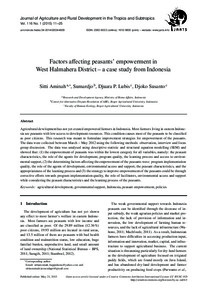Aufsatz

Factors affecting peasants’ empowerment in West Halmahera District – a case study from Indonesia
Zusammenfassung
Agricultural development has not yet created empowered farmers in Indonesia. Most farmers living in eastern Indonesia are peasants with low access to development resources. This condition causes most of the peasants to be classified as poor citizens. This research was meant to formulate improvement strategies for empowerment of the peasants. The data were collected between March – May 2012 using the following methods: observation, interview and focus group discussion. The data was analysed using descriptive statistic and structural equation modelling (SEM) and showed that: (1) the empowerment of peasants was within the lowest category for all variables, namely: the peasant characteristics, the role of the agents for development, program quality, the learning process and access to environmental support, (2) the determining factors affecting the empowerment of the peasants were: program implementation quality, the role of the agents of development, environmental access and support, the peasant characteristics, and the appropriateness of the learning process and (3) the strategy to improve empowerment of the peasants could be through corrective efforts towards program implementation quality, the role of facilitators, environmental access and support while considering the peasant characteristics and the learning process of the peasants.
Zitierform
In: Journal of Agriculture and Rural Development in the Tropics and Subtropics. Kassel : Kassel University Press. - Vol. 116, No. 1 (2015), S. 11-25Sammlung(en)
Vol 116, No 1 (2015) (Journal of Agriculture and Rural Development in the Tropics and Subtropics (JARTS))Zitieren
@article{urn:nbn:de:hebis:34-2014020344939,
author={Aminah, Sitti and Sumardjo and Lubis, Djuara P. and Susanto, Djoko},
title={Factors affecting peasants’ empowerment in West Halmahera District – a case study from Indonesia},
year={2015}
}
0500 Oax 0501 Text $btxt$2rdacontent 0502 Computermedien $bc$2rdacarrier 1100 2015$n2015 1500 1/eng 2050 ##0##urn:nbn:de:hebis:34-2014020344939 3000 Aminah, Sitti 3010 Sumardjo 3010 Lubis, Djuara P. 3010 Susanto, Djoko 4000 Factors affecting peasants’ empowerment in West Halmahera District – a case study from Indonesia / Aminah, Sitti 4030 4060 Online-Ressource 4085 ##0##=u http://nbn-resolving.de/urn:nbn:de:hebis:34-2014020344939=x R 4204 \$dAufsatz 4170 7136 ##0##urn:nbn:de:hebis:34-2014020344939
<resource xsi:schemaLocation="http://datacite.org/schema/kernel-2.2 http://schema.datacite.org/meta/kernel-2.2/metadata.xsd"> 2015-06-10T11:58:05Z 2015-06-10T11:58:05Z 2015-05-21 1612-9830 2363-6033 urn:nbn:de:hebis:34-2014020344939 http://hdl.handle.net/123456789/2014020344939 eng Kassel University Press Urheberrechtlich geschützt https://rightsstatements.org/page/InC/1.0/ agricultural development governmental support Indonesia peasant empowerment policies 630 Factors affecting peasants’ empowerment in West Halmahera District – a case study from Indonesia Aufsatz Agricultural development has not yet created empowered farmers in Indonesia. Most farmers living in eastern Indonesia are peasants with low access to development resources. This condition causes most of the peasants to be classified as poor citizens. This research was meant to formulate improvement strategies for empowerment of the peasants. The data were collected between March – May 2012 using the following methods: observation, interview and focus group discussion. The data was analysed using descriptive statistic and structural equation modelling (SEM) and showed that: (1) the empowerment of peasants was within the lowest category for all variables, namely: the peasant characteristics, the role of the agents for development, program quality, the learning process and access to environmental support, (2) the determining factors affecting the empowerment of the peasants were: program implementation quality, the role of the agents of development, environmental access and support, the peasant characteristics, and the appropriateness of the learning process and (3) the strategy to improve empowerment of the peasants could be through corrective efforts towards program implementation quality, the role of facilitators, environmental access and support while considering the peasant characteristics and the learning process of the peasants. open access In: Journal of Agriculture and Rural Development in the Tropics and Subtropics. Kassel : Kassel University Press. - Vol. 116, No. 1 (2015), S. 11-25 Aminah, Sitti Sumardjo Lubis, Djuara P. Susanto, Djoko </resource>
Die folgenden Lizenzbestimmungen sind mit dieser Ressource verbunden:
Urheberrechtlich geschützt

